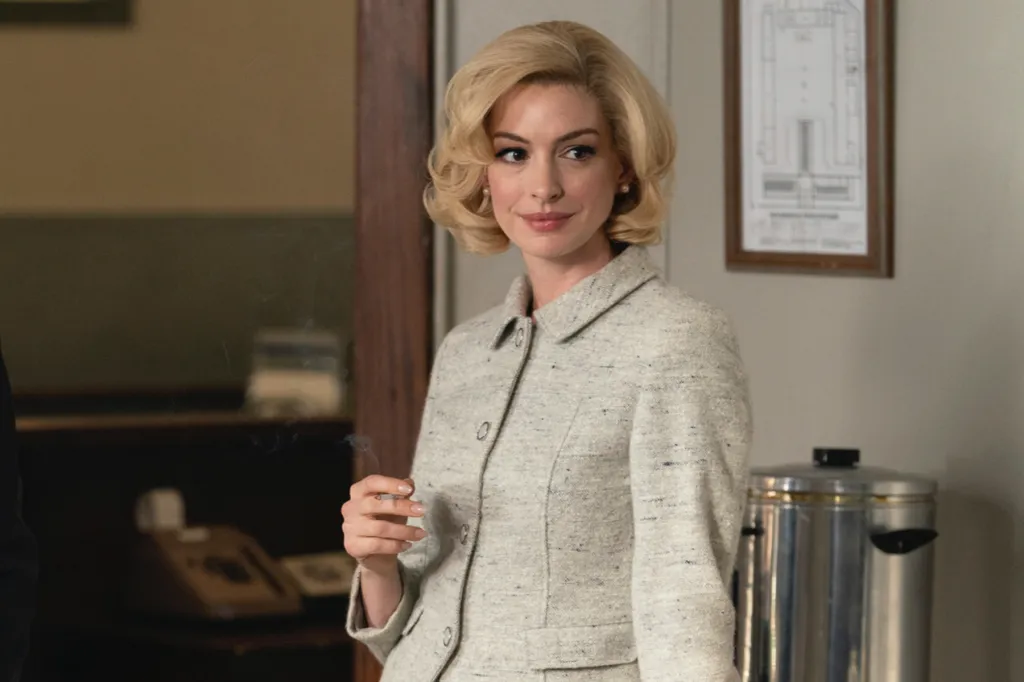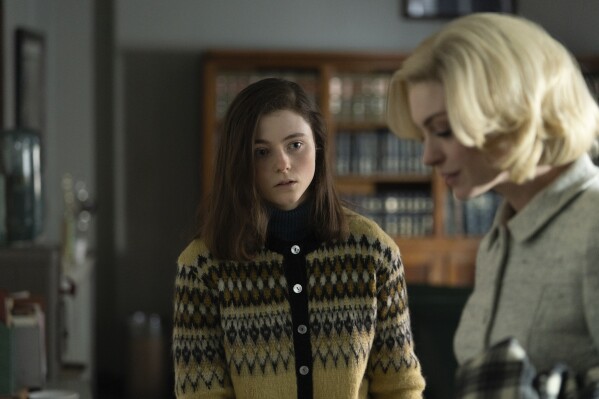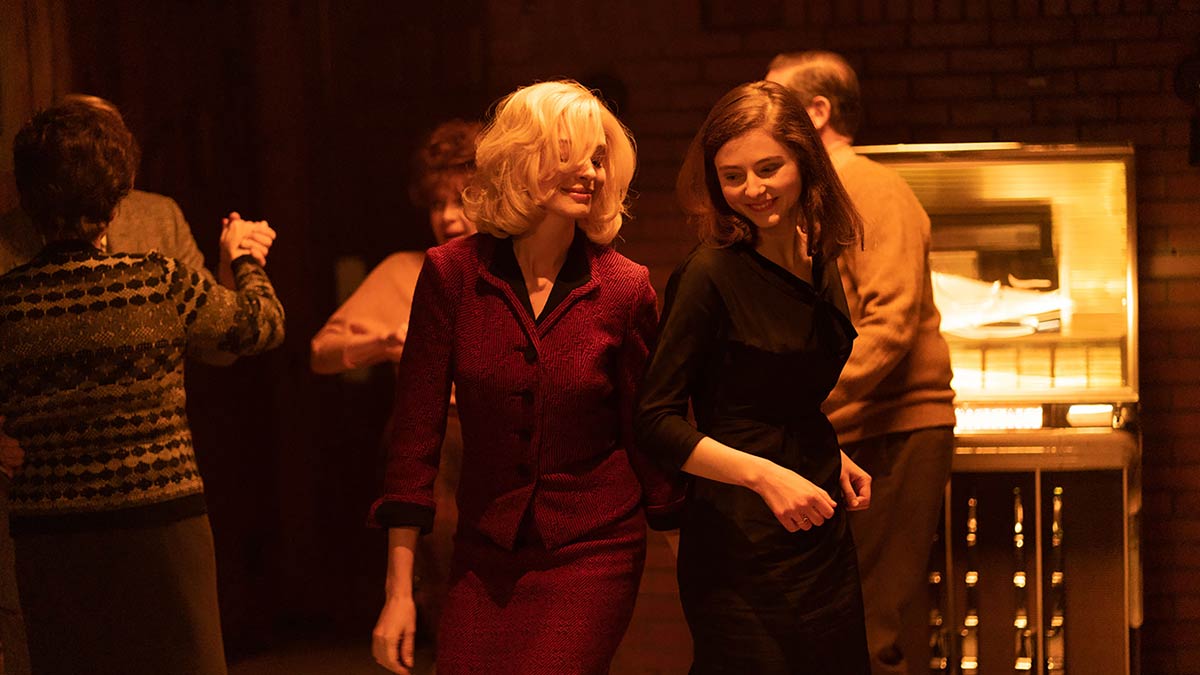Compulsively compelling Eileen—an offbeat period character study turned thriller of a shy young secretary at a Massachusetts juvenile correctional facility seduced by the allure of a newly appointed psychiatrist—is either an impressive genre straddler or an uneven potboiler. I couldn’t decide which (and perhaps it’s both), but that didn’t prevent my enjoyment of this odd concoction of noir-ish, sapphic shocks and young adult self-actualization, mainly because of a pair of performances by Thomas McKenzie and Anne Hathaway that keep us anxiously on edge throughout.
Based on the 2015 novel by Ottessa Moshfegh, co-adapting her source with screenwriter husband Luke Goebel (Causeway), and directed by William Oldroyd (Lady Macbeth), this 1964-set lurid tale of a young woman coming into her own by proving just how far she will go for infatuation and independence is psychologically mysterious and deeply unsettling. In the titular role, McKenzie, the twenty-three-year-old New Zealand star of Leave No Trace, Last Night in Soho and Jojo Rabbit, projects a delicacy like no other actress of her generation, her tenderly childlike voice belying her age and her bright eyed, not-so naïveté ready to bloom off its young rose. Those qualities serve her well as Eileen, McKenzie initially suggesting a curious babe in the very dark woods of a small town, with dead-end-ness from every direction.
Eileen Dunlop (McKenzie) works in a dreary desk job at the local boy’s prison where she’s chided daily by her jaded boss (Siobhan Fallon Hogan) before going home each night to care for her alcoholic, ex-police chief father (Shea Whigham). Her mother having passed, the pair live together in a run down house somewhere in undefined Massachusetts. As for dad, Eileen tolerates routinely being told how unremarkable she is, and that will never be one of those people who are “making moves,” all while managing her father’s ill health and dangerous habit of waving around his loaded pistol (see also Chekov’s axiom). This is an unforgiving backdrop for a young lady to transcend, to say the least.

Yet Eileen deflects her grim circumstances with a puzzle of an inner life. She is not what you might call uncorrupted, having dropped out of college in favor of a working class job and nursing her own dark fetishes. In the film’s opening scene, she sits alone in her car (which has a habit of smoking from the inside) at a local lover’s lane, a voyeur to an erotic coupling that leaves her sexually aroused, furiously suppressing her urges with snowy ice shoved into her crotch. Eileen’s fantasy excursions also extend to the workday, a respite from the depressing monotony, where she nurses a fascination with an incarcerated local teen (Sam Nivola) accused of murdering his father.
An opening presents itself on the arrival of new colleague Rebecca (Hathaway), a beguiling, Harvard-educated psychiatrist who takes an inmate counseling job. One look at Rebecca and Eileen is transfixed. But does she want to be her, have sex with her or perhaps love her? Rebecca, a confidently stylish platinum blonde with sensuality to spare is also a smooth talking tough cookie, and the pair immediately forge a connection, soon dancing cheek to cheek at the local watering hole, Eileen cloaked in her dead mother’s fur and Rebecca throwing a roundhouse at an out-of-line local. Rebecca is an enigma, looking and sounding first class while a barely contained cynicism and impulsivity hint at something brutal in her make-up. Both women keep us guessing. It takes some time for Eileen’s psycho thrills to arrive, but patience pays off in one shivery, mic drop line of dialogue that had my jaw on the floor going into the film’s diabolical third act.
One of Eileen’s strongest suits is the complexity it allows both women; we are never sure what is lurking beneath them and full psychological profiles are buried deep and out of view. Eileen is both both guarded and cautious but also flirtatiously alive, taking big risks as the film progresses. I was reminded of Peter Jackson’s 1994 Heavenly Creatures at one juncture—two incomplete souls inadvertently lock together, making anything criminal possible—albeit without that picture’s clear adolescent intentionality. What Rebecca does for Eileen is to give her a shot of obsession as well as a personal identity blueprint. McKenzie, despite reaching for her Boston-esque accent, excels at playing a bright young persona ready to shed the muted role of unsophisticated provincial, receding to the margins until Rebecca comes calling.

As for Rebecca, Hathaway has taken a page from the classic femme fatale playbook that would do Barbara Stanwyck proud, but to singularly categorize Rebecca as a film noir archetype would betray the clearly damaged psyche scraping around underneath that beautifully polished veneer, less overtly scheming than suddenly, inadvertently in over her pretty head. Hathaway stuns in the role, filled with a persuasive, sexy nerviness (and nervousness) that turns so dark as to generate shivers. But how much of Rebecca’s act is mere theatrics versus, say, on the order of Clouzet’s Diabolique? Hathaway cuts a lean, mean line through the film; pity her Hitchcock-cool blonde is given somewhat psychological short shrift, ironic given the character’s profession.
Eileen presents two women either in macabre control of their destines or perhaps at the edge of madness. Where Eileen’s life ultimately may be headed is anyone’s guess, but her fantasy of running off to New York City may prove more pipe dream than fairy tale; we are left to decide whether her final act is liberating or evasive. Throughout this unpredictable (and sometimes stylistically awkward) picture Oldroyd manufactures an oppressive atmosphere of no escape, both women (and perhaps a third who deliverers a blood-run-cold, climactic disquisition of domestic horror) clearly seeking to transcend a pre-feminist American epoch and working class milieu, tyrannized perhaps yet simmering under the skin with hidden rebellions of sexual longing and possible malevolence. A welcome lump of unrepentant holiday movie season coal, Eileen intrigues in offering no resolution for its anti-heroines’ discomfiting predicaments.
3 stars




🎬✨ Compulsively Compelling: Eileen 🌹🕵️♀️ An offbeat thriller blending noir and self-discovery, “Eileen” keeps you on edge with stellar performances by Thomas McKenzie and Anne Hathaway. A psychological and unsettling journey, this adaptation of Ottessa Moshfegh’s novel is a must-watch! 📖🎥
Thanks for the comment! Glad you enjoyed the film!